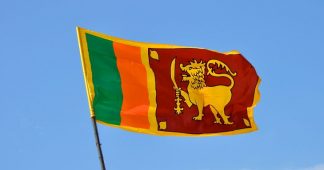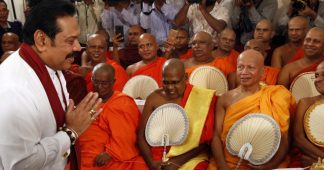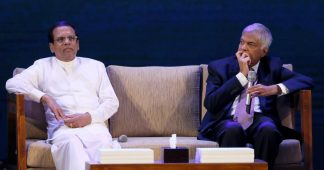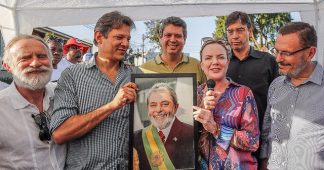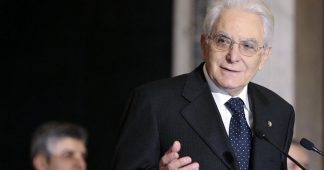By Lasanda Kurukulasuriya
“Everything must change, so that everything can stay the same” is a much quoted line from Giuseppe di Lampedusa’s classic in political fiction titled The Leopard. An eventful week in Sri Lankan politics that saw the naming of Sajith Premadasa as presidential candidate of the ruling UNP (United National Party)illustrates the dictum well.
The struggle for nomination between the Ranil and Sajith factionswithin the UNP endedwith deputy leader Premadasa’s candidacybeing endorsed by the party’s influentialworking committee.At the same time it would appear Ranil Wickremesinghe has played his cards shrewdly. A resolution has been adopted at the party convention of 3rd Oct.ensuring that Wickremesinghe will remain party leader, whilethere is reportedly an understanding also that he would continue as prime minister, in the event of a UNP victory. This would mean that Wickremesinghe has effectively shackled his challenger, circumscribing his moves upon becoming president, if he wins.
Premadasa has sought to deflect questions relating to ‘conditionality’ of his status. At his first post-nomination media briefingthe aspiring leader refused to be drawn on the issue, despite a barrage of questions. “All I said was that Sajith Premadasa is a person who will never bow down to conditions in order to achieve political goals” he said defensively, urging reporters to check their facts before asking questions.
As a candidate with wide grass-roots appeal Premadasa clinched the nomination only after a long and bitter struggle that had threatened to split the party. The decision was ultimately forced on Wickermesinghe in the light of the younger contender’s undeniable popularity, demonstrated at three rallies organized by the faction supporting him, and multiple defections by Wickremesinghe loyalists.Wickremesinghe kept insisting that he be the candidate despite his poor electoral record, giving rise to speculation thathe harbours more anxiety on account of the prospect of losing the party leadership, than that of losing the presidential election. If he contests and loses, he would still retain the post of UNP leader and in all likelihood become Leader of the Opposition.If on the other hand a candidate other than he contests and wins, he would have to cede the party leadership to the newcomer and end upbeing simply an Member of Parliament.
This brings us to the problematic understanding (condition?) relating to Sajith Premadasa’s nomination – that Wickremesinghe will continue to be prime minister in the event of a UNP win.Among the powers of an executive president in terms of the constitution, is that of appointing a prime minister and, on the advice of the prime minister, a cabinet of ministers. One needs to ask whether a presidential prerogative, enshrined in the constitution, can be usurped through an understanding reachedweeks ahead of a presidential election. Besides, Premadasa supporters may well ask, what’s the point in bringing in a new president if he is unable to leave his imprint on the new government, to start afresh with a new mandate, with new ideas and better policies? Has Wickremesinghe effectively pre-empted Premadasa from introducing any significant and refreshing change – which is what alarge section of the UNP membership and their constituents want in the first place?
A parallel development alongside Premadasa’s already-encumbered nomination is a resolutionadopted by the UNP party convention, to take forward the constitutional reform process commenced by the government in 2015 with regard to devolution, electoral reforms and the executive presidency, but with concurrence of the prime minister.
Abolition of the executive presidency was a leitmotif of the 2015 UNP-led United National Front (UNF) campaign supporting the SLFP’s then health minister Maithripala Sirisena as a ‘common candidate’for the presidency. Sirisena became president but abolition of the executive presidency did not materialize during the unity government’s term, and remains problematic.
The timing of the resolution to ‘reiterate policy’ of 2015 relating to abolition of the executive presidencyraises questions as to whether the move was made in good faith. It seems to have more to do with the subterranean currents within the UNP than anything to do with policy. Itcomes just ahead of an election to bring in a new executive president, who will not be the present UNP leader.
It also comes against the backdrop of a last ditch attempt to have the executive presidency scrapped, at a cabinet meeting shortly before the UNP candidate was announced. This little piece of intrigue was scotched after it was condemned out of hand by the UNF’s constituent parties’ leaders, who backed Premadasa’s candidacy.The abolition of the post of executive president would effectively shift power to the post of prime minister. According to the prior understanding believed to have been reached with Premadasa, the PM’s post will go to Wickremesighe. Thus Premadasa would be relegated to a ceremonial role and Wickremesinghe will assert the real power in government. “Everything must change, so that everything can stay the same!”
Pressed by reporters on the question of abolition of executive presidency at his firstmedia conference as UNP nominee, Premadasa, having parried the question a couple of times, finally gave a statement: “I am in favour of the resolution passed at the UNP working committee, which was to continue the process that was commenced in 2015 with regard to the three areas mentioned” he said.
Wickremesinghe virtually admitted to the cynicism behind his moves when he addressed a group described as civil society representatives at Temple Trees on Sunday. He said the government needed to be in power for the next few years in order to introduce a new constitution, according to a statement from his office.It said (in rough translation) “For the government to remain in power it is necessary to win the presidential election. We have made UNP deputy leader Sajith Premadasa the presidential candidate. Thereafter we expect to win the parliamentary election with a majority. So that work we couldn’t do as a minority government can be carried out with a majority.” Does this sound as if Premadasa’s popular appeal is simply being used to draw votes and win a parliamentary majority that will pave the way for Wickremesinghe to carry out his plans?
Premadasa has been further disadvantaged by being denied the UNP’s elephant symbol for the ballot, given instead the swan symbol that was used by ‘common candidates’ in two previous presidential elections. ButPremadasa unlike Sarath Fonseka (2010) and Maithripala Sirisena (2015), is a die hard UNPer. One does not need to be marketing guru to see the advantage of contesting under a familiar, well established symbol that voters immediately associate with a party and the values it stands for. It is for this same reason that Opposition LeaderMahinda Rapapaksa’s SLPP refuses to budge on the SLFP demand that the lotus-bud symbol be changed in order to facilitate an alliance between the two parties.
Considering all these factors, it would appear that while the UNP leadership has given Sajith Premadasa the UNP presidential nomination with one hand, it has taken it back with the other.With the Sajith faction’s simmering frustrations over multiple internal issues still unattended, these tensions are likely to continue to spook the party even after the election, win or lose.
